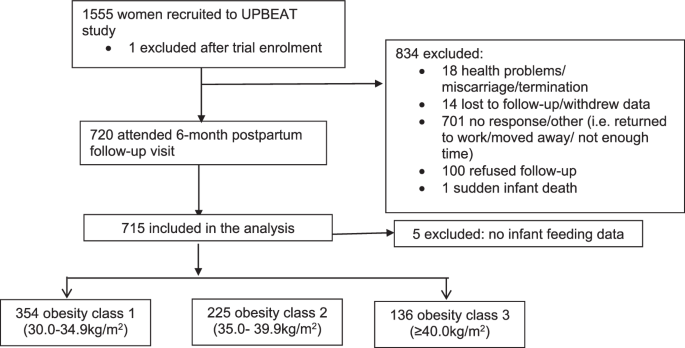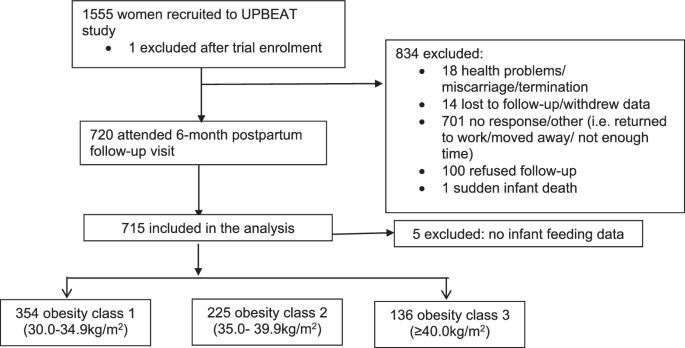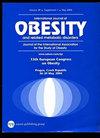肥胖妇女的母乳喂养行为;与体重保持和血清代谢组的关系:UPBEAT 的二次分析。
IF 4.2
2区 医学
Q1 ENDOCRINOLOGY & METABOLISM
引用次数: 0
摘要
背景/目的:产妇肥胖与母乳喂养的意愿和开始母乳喂养的次数减少以及母乳喂养持续时间缩短有关。本分析旨在确定不同种族肥胖妇女队列中的母乳喂养行为,以及母乳喂养与母亲人体测量和产后 6 个月血清代谢组之间的关系:对英国孕妇更好的饮食和活动试验(UPBEAT)中的 715 名妇女进行队列分析;这是一项针对肥胖妇女的产前生活方式干预的多中心随机对照试验。孕产妇数据在孕早期收集,包括体重指数(BMI)、社会人口特征和人体测量。产后 6 个月时,记录了母乳喂养行为、人体测量和血液样本中的 158 项产妇代谢指标。构建了母乳喂养持续时间的 Kaplan-Meier 曲线,并按肥胖等级进行了分层(I:BMI 30.0-34.9 kg/m2;II:35.0-39.9 kg/m2;III:≥40.0 kg/m2)。通过回归分析确定了母乳喂养行为、社会人口特征、代谢组和人体测量之间的关系:82%(591/715)的同组婴儿开始母乳喂养,在 6 个月的随访中,40%(283/715)的婴儿纯母乳喂养或部分母乳喂养。纯母乳喂养的持续时间随着体重指数的增加而缩短:与 BMI I 级(平均 90.4 ± 64 天)相比,II 级和 III 级的平均差异为-15.8 天(95% 置信区间:-28.5, -3.1,p):更加重视肥胖妇女的母乳喂养,可以延长母乳喂养时间,改善妇女的体重管理和代谢健康。需要进一步研究黑人妇女母乳喂养对人体测量的影响:临床试验登记:ISRCTN 编号 89971375。本文章由计算机程序翻译,如有差异,请以英文原文为准。


Breastfeeding behaviours in women with obesity; associations with weight retention and the serum metabolome: a secondary analysis of UPBEAT
Maternal obesity is associated with a decreased intention and initiation of breastfeeding as well as a shortened duration of breastfeeding. This analysis was undertaken to identify breastfeeding behaviours, and relationships with maternal anthropometry and the serum metabolome at 6-months postpartum in an ethnically diverse cohort of women with obesity. A cohort analysis of 715 women from the UK Pregnancies Better Eating and Activity Trial (UPBEAT); a multi-centre randomised controlled trial of an antenatal lifestyle intervention in women with obesity. Maternal data were collected in early pregnancy and included body mass index (BMI), socio-demographic characteristics and anthropometry. At 6-months postpartum, breastfeeding behaviours, anthropometry and 158 maternal metabolic measures from blood samples were recorded. Kaplan–Meier curves of breastfeeding duration were constructed and were stratified by obesity class (I: BMI 30.0–34.9 kg/m2, II: 35.0–39.9 kg/m2, III: ≥40.0 kg/m2). Relationships between breastfeeding behaviours, socio-demographic characteristics, the metabolome, and anthropometry were determined using regression analyses. Eighty-two percent (591/715) of the cohort-initiated breastfeeding and at the 6-month follow-up 40% (283/715) were breastfeeding exclusively or partially. Duration of exclusive breastfeeding decreased with increasing BMI: Compared to BMI class I (mean 90.4 ± 64 days) the difference in mean for classes II and III were −15.8 days (95% confidence interval: −28.5, −3.1, p < 0.05) and −16.7 (95% CI: −32.0 to −1.35, p < 0.05), respectively. Compared to no breastfeeding, any breastfeeding at 6-months postpartum was associated with improvements in metabolites towards a healthier profile, reduced weight retention by −1.81 kg (95% CI −0.75, −2.88, p < 0.05 ) and reduced anthropometric measures, including mid-upper arm and hip circumferences. The breastfeeding related changes in anthropometry were not evident in women of Black ethnicity. Greater emphasis on enabling breastfeeding for women with obesity could improve duration, women’s weight management and metabolic health. The lack of breastfeeding related anthropometric effects in Black women requires further investigation. ISRCTN reference 89971375.
求助全文
通过发布文献求助,成功后即可免费获取论文全文。
去求助
来源期刊

International Journal of Obesity
医学-内分泌学与代谢
CiteScore
10.00
自引率
2.00%
发文量
221
审稿时长
3 months
期刊介绍:
The International Journal of Obesity is a multi-disciplinary forum for research describing basic, clinical and applied studies in biochemistry, physiology, genetics and nutrition, molecular, metabolic, psychological and epidemiological aspects of obesity and related disorders.
We publish a range of content types including original research articles, technical reports, reviews, correspondence and brief communications that elaborate on significant advances in the field and cover topical issues.
 求助内容:
求助内容: 应助结果提醒方式:
应助结果提醒方式:


